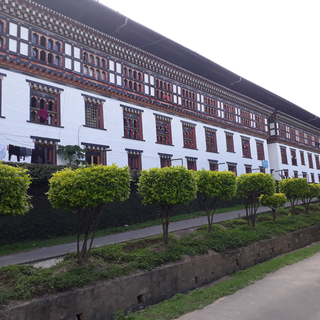
Botswana, officially the Republic of Botswana, is a landlocked country in Southern Africa. Botswana is topographically flat, with approximately 70 per cent of its territory part of the Kalahari Desert. It is bordered by South Africa to the south and southeast, Namibia to the west and north, Zambia to the north and Zimbabwe to the northeast. With a population of slightly over 2.4 million people and a comparable land area to France, Botswana is one of the most sparsely populated countries in the world. It is essentially the nation-state of the Tswana people, who constitute nearly 80 per cent of the population.

The United States Department of Agriculture (USDA) is an executive department of the United States federal government that aims to meet the needs of commercial farming and livestock food production, promotes agricultural trade and production, works to assure food safety, protects natural resources, fosters rural communities and works to end hunger in the United States and internationally. It is headed by the secretary of agriculture, who reports directly to the president of the United States and is a member of the president's Cabinet. The current secretary is Tom Vilsack, who has served since February 24, 2021.

The Animal and Plant Health Inspection Service (APHIS) is an agency of the United States Department of Agriculture (USDA) based in Riverdale, Maryland responsible for protecting animal health, animal welfare, and plant health. APHIS is the lead agency for collaboration with other agencies to protect U.S. agriculture from invasive pests and diseases. APHIS's PPQ is the National Plant Protection Organization for the U.S., and the agency's head of veterinary services/veterinary Deputy Administrator is the Chief Veterinary Officer of the United States.

In Botswana, the responsibilities for education fall under the Ministry of Education and Skills Development, which oversees basic, secondary, and tertiary education, as well as vocational and skills training. The ministry's functions include policy formation and implementation, curriculum development, teacher training, and the administration of schools across the country.

The Federal Ministry of Agriculture and Rural Development is a Ministry of the Federal Government of Nigeria that has the mandate to ensure food security in crop, livestock and fisheries, stimulate agricultural employment and services, promote the production and supply of raw materials to Agro-allied industries, provide markets for the products of the industrial sector, generate foreign exchange and aid rural Socio-economic development throughout Nigeria. Mohammad Mahmood Abubakar is the current Minister of Agriculture and Rural Development. Abubakar replaced Sabo Nanono and took charge of the affairs of the Ministry of Agriculture and Rural Development in September 2021, after he was redeployed from the Federal Ministry of Environment by President Muhammadu Buhari.

Food safety is used as a scientific method/discipline describing handling, preparation, and storage of food in ways that prevent foodborne illness. The occurrence of two or more cases of a similar illness resulting from the ingestion of a common food is known as a food-borne disease outbreak. This includes a number of routines that should be followed to avoid potential health hazards. In this way, food safety often overlaps with food defense to prevent harm to consumers. The tracks within this line of thought are safety between industry and the market and then between the market and the consumer. In considering industry-to-market practices, food safety considerations include the origins of food including the practices relating to food labeling, food hygiene, food additives and pesticide residues, as well as policies on biotechnology and food and guidelines for the management of governmental import and export inspection and certification systems for foods. In considering market-to-consumer practices, the usual thought is that food ought to be safe in the market and the concern is safe delivery and preparation of the food for the consumer. Food safety, nutrition and food security are closely related. Unhealthy food creates a cycle of disease and malnutrition that affects infants and adults as well.

The Ministry of Agriculture and Food Security of Israel is the ministry of the Israeli government that oversees the country's agricultural industry. The ministry was originally called Ministry of Agriculture, in 1992 the title was changed to Ministry of Agriculture and Rural Development. The Development Ministry, which oversaw rural development, was abolished in 1974.
Bhaskaracharya College of Applied Sciences (BCAS) is a constituent college of the University of Delhi. Commonly known as BCAS, it is completely funded by the Government of Delhi. Established in 1995, it offers undergraduate courses in various disciplines of sciences and applied sciences. It is ranked 27th among colleges in India by the National Institutional Ranking Framework (NIRF) in 2024, the institution has produced distinguished alumni in the field of science. It has been honoured with 'Star College' status by the Ministry of Science and Technology. Alumni of this college are called 'Bhaskaracharyans' or BCASians.
The Botswana Accountancy College, also known as BAC, is a business school which is headquartered in the city of Gaborone, Botswana. Initially funded and established through a joint venture between the Ministry of Finance and Development Planning and Debswana, the college caters for the accountancy and information technology tertiary needs of the country. The Botswana Accountancy College asserts itself as the center of excellence in Southern Africa and beyond. It specializes in areas of accounting, finance, business, management, hospitality, taxation, leisure, and ICT. BAC has two campuses; the main campus is in Gaborone, and the other in Francistown. The Gaborone Campus is located in the Fairgrounds Office Park of south-east Gaborone.

The Ministry of Education and Skills Development is a government ministry of Botswana. Its offices are in Gaborone. The Ministry of Tertiary Education, Research Science and Technology exists to provide and build knowledge and innovation through the development and implementation of policy on Tertiary Education, Research, Science and Technology to transform Botswana in to a knowledge based society through effective stakeholder collaboration

The College of Natural Resources, Royal University of Bhutan is a college offering courses on natural resources management, that include organic agriculture, animal science, environment and climate, food science and technology, forest science and sustainable development The college is located in Lobesa, Punakha District, in central west Bhutan. The college campus is spread over 98 acres (40 ha) on the eastern slope of Lobesa and is about 140 km (87 mi) away from the Paro International Airport.
Statistics Botswana (StatsBots) is the national statistical bureau of Botswana. The organization was previously under the Ministry of Finance and Development Planning as a department and was called Central Statistics Office. The organisation was initially set up in 1967 through an Act of Parliament – the Statistics Act and thereafter transformed into a parastatal through the revised Statistics Act of 2009. This act gives the Statistics Botswana the mandate and authority to collect, process, compile, analyse, publish, disseminate and archive official national statistics. It is also responsible for "coordinating, monitoring and supervising the National Statistical System" in Botswana. The office has its main offices in Gaborone and three satellite offices in Maun, Francistown and Ghanzi. The different areas in statistics that should be collected are covered under this Act and are clearly specified. The other statistics that are not specified can be collected as long as they are required by the Government, stakeholders and the users.
The Rivers State Agricultural Development Programme is a government parastatal within the Ministry of Agriculture. It was established under the Law on the Agricultural Development Programme of Rivers State 1988. Its functions include formulating and implementing programmes relating to Agriculture as well as providing extension services to farmers in both rural and urban areas of the state.

The Ministry of Agriculture and Food Security, abbreviated MAFS, is a ministry of the Government of Malaysia that is responsible for agriculture, agro-based industry, agritourism, livestock, veterinary services, fisheries, quarantine, inspection, agricultural research, agricultural development, agricultural marketing, pineapple industry, agribusiness, botanical garden, food security, food sovereignty.
Science and technology in Botswana examines recent trends and developments in science, technology and innovation policy in this country. The Republic of Botswana was one of the first countries of the Southern African Development Community (SADC) to adopt a science and technology policy in 1998. This was later updated in 2011.

Slumber Tsogwane is a Motswana politician who is the Former Vice President of Botswana from April 2018 to November 2024. He is also former Member of Parliament for Boteti West. He was the longest serving Member of Parliament of the 12th Parliament of Botswana. He is a member of the Botswana Democratic Party.
Companies and Intellectual Property Authority (CIPA) is Botswana's registrar of companies and is a government parastatal. It falls under the Ministry of Trade and Industry. All forms of companies (as permitted by Botswana Companies and Intellectual Property Authority Act) are incorporated and registered with CIPA and file specific details as required by the current Companies and Intellectual Property Authority Act. All registered limited companies, including subsidiary, small and inactive companies, must file annual financial statements in addition to annual company returns. Registering of companies is now done online since the introduction of online business registration system launched by Bogolo Kenewendo.
The Australian Department of Agriculture, Water and the Environment (DAWE) was an Australian Government department which operated from 1 February 2020 until 30 June 2022. It represented Australia's national interests in agriculture, water and the environment.
Botswana Energy Regulatory Authority (BERA) is the energy regulator and a government parastatal of the Botswana government. The parastatal was founded after the Botswana Energy Regulatory Act was put in place in 2016 and started its operations on the 1st September, 2017.









